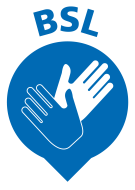A six-strong team from North East Ambulance Service (NEAS) delivered life-saving training at Peace of Mind CIO based in Gateshead as part of plans to turn our region into lifesavers.
The session, organised in conjunction with Peace of Mind, was the first of three targeted at people who evidence suggests may need additional support to help them deliver bystander cardio-pulmonary resuscitation (CPR).
In 2023/24, the North East Ambulance Service attended 5,863 cardiac arrests across the region. Only 30% of patients who did not receive bystander CPR achieved a return of spontaneous circulation (ROSC) as opposed to the 57.1% who did receive it. Likewise, only 9.3% of cardiac arrest patients survived to 30 days post-arrest without bystander CPR intervention. Those who did receive bystander CPR saw their 30 days post-arrest survival rate jump to 39.3%.
The importance of bystander CPR therefore can't be understated. For every 30 people who receive it, we know that one additional life is saved.
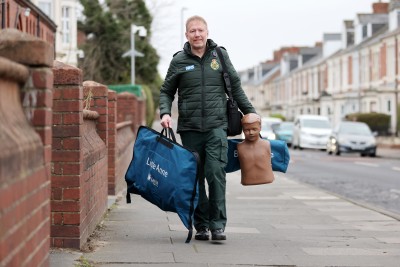
A cardiac arrest happens when the heart suddenly stops pumping, which prevents blood from flowing to the brain and other vital organs, depriving them of oxygen. This is different from a heart attack, although a heart attack can lead to a cardiac arrest.
Chest compressions provided during CPR pump blood around the body to keep someone alive until the paramedics arrive.
Without immediate treatment with CPR – and a defibrillator if there is one nearby – the person will die within minutes.
Sadly, the North East region has a disproportionately high rate of incidents of cardiac arrest but a low rate of bystander CPR.
NEAS paramedics carried out research in 2021 to understand the reason people in our region were more reluctant to give CPR when needed.
Since then, the research team at NEAS has been working with the teams responsible for delivering CPR training in the region’s communities to target areas most in need.
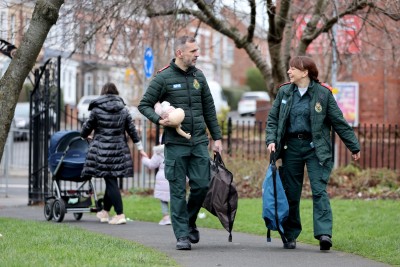
Bensham-based charity Peace of Mind supports newly arrived and existing refugees and asylum seekers to integrate into new and unfamiliar surroundings and to overcome some of the difficulties they face.
The charity has worked with NEAS on a bespoke training package for people whose first language is not English.
The NEAS team delivered that training to 30 members of the community in four different languages – Farsi, Arabic, Kumanji and Sorani – on 23 December.
The training included:
- Chain of survival and the role of bystander CPR
- How to assess a patient and when to call 999 or start CPR
- How to identify a heart attack or a cardiac arrest
- Compression only CPR
- Familiarisation with a defibrillator
- Importance of using a defibrillator if one has been retrieved
Similar sessions are planned for groups including older adults and people from an area with deprivation.
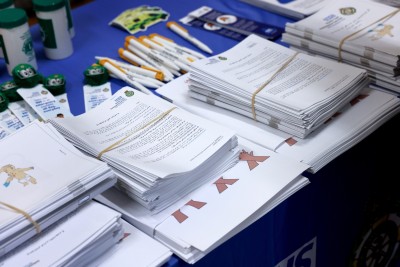
Research paramedic Karl Charlton, who led on the research behind this work, said: “Early recognition of cardiac arrest and bystander CPR and defibrillation can drastically improve a patient’s chance of survival
“Our research found that people often misunderstood the difference between cardiac arrest and heart attack and were reluctant to give CPR to women for fear of exposing them. We identified a general need for more training, irrespective of a person’s background and education.
“We identified that people have different needs and that offering a one size fits all form of CPR training may not be effective, and so we’ve been working with our local communities to design bespoke training that we hope people may be more likely to engage with.”
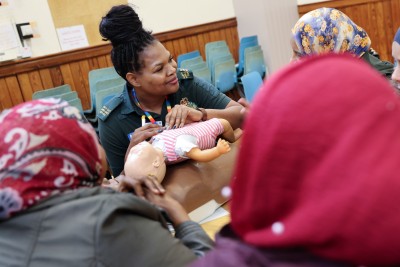
Loveness Scott leads on the Positive Action Project at NEAS, working closely with diverse communities to ensure they have the skills and knowledge they need to perform CPR and access the ambulance service when they need it.
She said: “Peace of Mind recognises that people from diverse communities have got little understanding of how our services work, and has worked closely with us over the past few years to connect us with in the region of 150 people from diverse communities in Gateshead.
“The turnout is always great when we come to Peace of Mind and there’s always a real willingness to learn. This session was no different, it went down really well.
“We’re really looking forward to delivering more sessions like this throughout 2025. We hope no-one ever needs to use our services but at least we know we’re leaving them equipped with the knowledge they need if they do.”
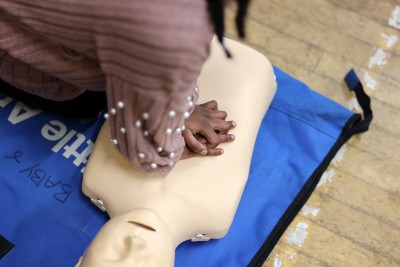
Sara Muzaffer from Peace of Mind said: “Peace of Mind CIO is proud to collaborate with the North East Ambulance Service to bring life-saving CPR training to our community.
“This initiative equips refugees and asylum seekers with the skills and confidence needed to respond in emergencies. By delivering training in multiple languages, NEAS ensures accessibility for those whose first language is not English, empowering them to make a difference when it matters most. We are committed to continuing this partnership to build a safer, more informed community in Gateshead.”
It only takes a few minutes to learn CPR. To find out more, visit https://

